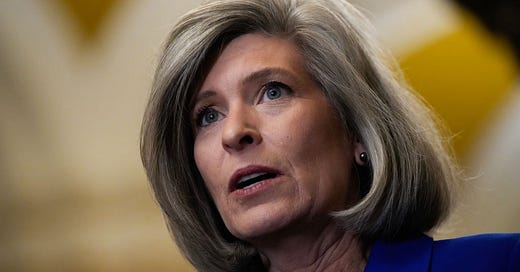It’s a mistake to assume that just because a person has experienced something that will give them empathy for others. Life experience is not field training for compassion.
An immigrant will not always want to make immigration laws more humane.
A victim of rape will not always believe other victims.
And Iowa Sen. Joni Ernst, who has spoken openly about her own assault, will not stop the nomination of Pete Hegseth, a man accused of assaulting a woman in 2017, to run the Department of Defense. (Hegseth has repeatedly said it was a consensual sexual encounter.)
Ernst was initially noncommittal on Hegseth’s nomination, stating at a panel at the Reagan National Defense Forum at the Ronald Reagan Presidential Library on December 7, “I am a survivor of sexual assault so I have worked very heavily on sexual assault measures within the military, so I’d like to hear a little more about that, and I’d like to hear about the role of women in our great United States military.”
After that mild hesitation, Ernst, who is up for reelection in 2026, has said very little about any concerns she might have about Hegseth. Meanwhile, right-wing pundits and politicians have been vocal about how Ernst needs to get in line. Turning Point USA’s Charlie Kirk has called for senators like Ernst to be primaried if they don’t back Trump’s picks. And Bob Vander Plaats, an influential Republican evangelical in Iowa, told NBC News that if Ernst doesn’t back Hegseth, she could face a primary challenge.
The message is clear: Swallow your concerns and get in line.
#MeToo as a movement initially united America. During Trump’s first presidency, the hashtag and related activism, first created by Tarana Burke in 2006, gathered new meaning. America was a country ruled by a man accused of sexual assault, and women both liberal and conservative harnessed a new level of rage to openly speak about their own assaults at the hands of men in power. Gretchen Carlson, Gabrielle Union, Beth Moore, Lady Gaga.
Men, liberal and conservative, were all suspect. Women knew the truth.
But it’s one thing to talk about your personal experiences; it’s another to change the system of power that made them possible. And while we could unite to take down a few bad men, burning it all down and building something new has not yet happened.
In a column this week, David French (and I can’t believe I am writing this) made an excellent point that the #MeToo movement hit a wall when it came to churches. It was one thing to talk about the dangerous men in secular institutions, but as French wrote, “Christians realized that what they thought was a ‘them’ problem was also an ‘us’ problem. The moral high ground slid away. #ChurchToo exposed the right, and the right wasn’t ready to repent.”
French, of course, has to go undermine his own argument by saying #MeToo went too far and making random comments about Black Lives Matter protesters burning cities to the ground (sorry what), because you can lead David French to a great point but you can’t make him less of a tool.
Still, one of his arguments holds. People wanted things to change, wanted to stop sexual violence, but were unwilling to do the work to change the very systems that imbued them with power in the first place.
It’s one thing to be outraged at Matt Lauer; another to realize that your pastor is a predator.
It’s one thing to bring down Roger Ailes; it’s another to bring down your son, your president.
It’s one thing to call out sexual assault in the military. It’s another to stand up to the system of power within your own party, within your own politics.
It’s not lost on me that in 2017, there was a whole movement that called out predators for their actions. And now in 2024, the language of that movement is being weaponized to target trans people. Nancy Mace and others like her are targeting a group of people who are not a problem, because facing the reality of who is the problem — the future president and his future cabinet, among others — hits too close to home.
And this scapegoating is successful among conservatives and liberals alike, not because the movement failed, but because it succeeded. It got too close to our individual lives. Too close to our sons, our fathers, our boyfriends, our husbands — the patriarchy that so many women comfortably rest in.
Despite the hand-wringing and wondering, Joni Ernst was never going to stand up to Trump, because standing up for victims of assault, actually ridding the military and other institutions of sexual assault, would mean changing the very way power works.





The speaker of the annual Planned Parenthood fundraiser was a doc who said she was continually confronted with conservative moms coming in with their daughters for abortions. These moms were abortion opponents, but this was an exception, not the icky type of abortions they opposed.
The human mind is amazing, in good and bad ways. How did Jefferson write about equality and keep slaves? The most anti-gay conservatives are always gay! I'm sure I have all of these same inconsistencies, but my own mind keeps me blind to them. Crazy, right?
The problem with #MeToo was that it quickly became apparent that virtually every male alive was guilty of harassing women. It really was ALL men, and most men decided they wanted to preserve their rights to harass and assault women with no consequences.